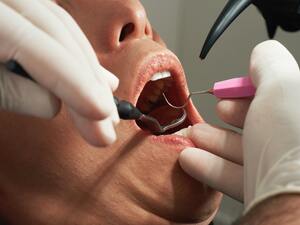You may have periodontal disease and not even realize it. The great news is the earlier you recognize it, the easier it is to limit the effects of the infection and improve your overall oral health. This disease affects the tissues holding your teeth in place and can even lead to tooth loss over time. So, knowing the signs and symptoms is important to prevent this issue.
Most Common Signs of Periodontal Disease
According to the CDC, over 47% of adults over 30 have periodontal disease. This percentage increases to 70% for adults 65 and older. As prevalent as it is, early detection is key to keeping this oral disease from damaging your teeth.
When brushing and eating, pay close attention to any changes. This includes everything from increased sensitivity to gum pain. The most common symptoms you might notice include:
- Pain when chewing or brushing
- Sensitive or even loose teeth
- Tender or swollen gums
- Bleeding gums
- Receding gums
- Bad breath that brushing doesn’t eliminate
- Changes in the way oral equipment fits
Any of these changes should be taken seriously. But remember, this doesn’t mean you have an advanced form of the disease. However, noticing the symptoms is step one in treating the problem.
When to See Your Dentist
Outside of seeing your dentist for your regular checkups, you should call your dentist if you start noticing any of the above symptoms of periodontal disease. Some of the issues could be something else entirely. For example, a cavity or worn tooth could be the cause of your sensitivity. But only your dentist can tell for sure.
Change Your Oral Routine
If you’re noticing signs and symptoms, you’ll also want to pay closer attention to your oral health routine. Bacteria that builds up on your teeth forms plaque, which then forms into tartar. If left untreated, the bacteria leads to infection. Only your dentist can remove the tartar once it forms and stop the infection.
You can help prevent bacteria and plaque by:
- Brushing twice daily with a fluoride toothpaste
- Flossing daily
- Stop smoking
- Limit sugary foods
If your dentist discovers you have periodontal disease, they’ll give you guidelines on any changes you can make. Let your dentist know about any health conditions or medications you take, as they may increase your risk for this disease.
Afraid you may be dealing with periodontal issues? Learn more about Wayman Family & Cosmetic Dentistry’s periodontal care.

